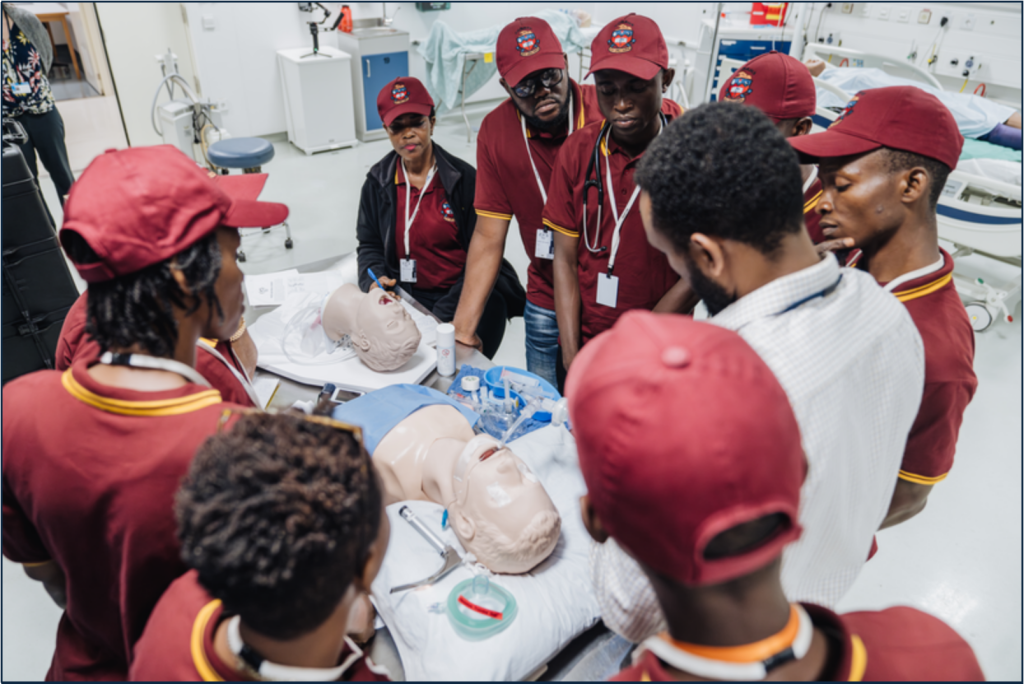In a groundbreaking partnership to address the critical shortage of anaesthesia providers in the country, Mercy Ships (www.MercyShips.org), Sierra Leone’s Ministry of Health, and the University of Sierra Leone have launched a Nurse Anesthesia Diploma Programme. This initiative aims to improve surgical care capacity by training specialised nurse anaesthetists, ensuring lasting healthcare improvements, even after Mercy Ships depart Freetown.
Suzanne Thomas, Mercy Ships Director of Education, Training, and Advocacy, emphasised the importance of this collaboration: “Our partnership with the Ministry of Health and the University of Sierra Leone is crucial for developing long-term solutions to the healthcare challenges here. The Nurse Anesthesia Diploma Programme was specifically requested by our partners at the Ministry of Health, recognising the urgent need for more trained anaesthesia providers in government hospitals.”
Sierra Leone has approximately 0.1 anesthesiologists per 100,000 population, or one anesthesiologist per million people (https://apo-opa.co/405N0yz), which is drastically lower than the World Health Organization (WHO) recommendation of 20 per million. Approximately 90% of surgical procedures (https://apo-opa.co/3NrJqaw) in Sierra Leone are conducted without a trained anesthesiologist, increasing the risk of complications among patients seeking critical surgical care. The perioperative mortality rate in Sierra Leone can be as high as 1 in 20 for major surgeries, significantly higher than in high-income countries.
These startling statistics underscore the challenges in many middle- and low-income countries, but in Sierra Leone particularly, where specialised anaesthesia training is cited as a major need throughout its healthcare sectors.
Launched in April 2024, the programme started with 20 experienced nurses from across Sierra Leone, focusing on both theoretical and practical anaesthesia training. Students receive initial training aboard the Global Mercy™️ in its simulation centre and later attend classes at the School of Nursing adjacent to Connaught Hospital in Freetown.
Josefin Tapper, a volunteer Anesthesia Team Leader on the ship from Sweden, works closely with the healthcare professionals who come on board for training.
She said: “It’s been really rewarding having them on board and sharing professional skills. I think that’s the way to go if you want to make a lasting impact in the countries we serve in to mentor, educate, and advocate for our colleagues here so that they can have a better chance of doing their job to their best ability.”
One of the tutors helping facilitate the training, Hailemariam Kasim, is an assistant professor of Anesthesiology at the University of Dilla, Ethiopia, and an Anesthetist Consultant with several years of academic and research experience.
Kasim said: “The nurse anaesthesia diploma programme in Sierra Leone is a beacon of hope, addressing the critical shortage of anaesthesia care providers and directly contributing to the reduction of the high burden of surgical disease in the country.”
“This programme is not just about training; it’s about empowering a new generation of healthcare professionals who will play a pivotal role in transforming the healthcare landscape of Sierra Leone, making safe surgical care accessible to all.”
Students like Mohammed Bangura are eager to contribute. “This programme will have a huge impact on my career because I will no longer be an ordinary medical practitioner at the end of this training but someone with a specific speciality. This is going to have a huge impact on our country’s health sector,” Bangura said.
Once this course is completed, these students will augment the healthcare workforce throughout the country. Graduates will be able to bolster the number of anaesthesia providers in the country, which will help increase Sierra Leone’s healthcare system’s capacity to perform necessary surgeries safely.
With support for three years, Mercy Ships will continue to provide tutors and help develop local faculty to ensure the sustainability of the programme that will continue to provide qualified anaesthesia providers for years to come. The Ministry of Health has committed to employing graduates to improve access to safe surgery, particularly in underserved areas.
Dr Sandra Lako, Mercy Ships Country Director in Sierra Leone, noted: “Sierra Leone has a population of over 8 million but only about 50 nurse anaesthetists and two anesthesiologists in government service. The estimated need is at least 200 anaesthesia providers. By training an initial cohort of 20 nurses and planning for additional ones, we aim to make a substantial impact on the surgical workforce.”
This initiative reflects Mercy Ships’ broader commitment to strengthening healthcare systems in the nations it serves, leaving a lasting impact even after its ships sail away.
Around 70% of hospitals in sub-Saharan Africa (https://apo-opa.co/3NrZFnQ) lack the essential infrastructure and supplies for safe anaesthesia, including necessary medications and equipment.
The impact of the Nurse Anesthesia Diploma Programme extends beyond immediate training. The collaboration aims to ensure that trained nurse anaesthetists are deployed effectively across the country, especially in rural and underserved areas that lack anesthesiologists, improving access to safe surgery for millions of Sierra Leoneans. The Ministry of Health has committed to employing these students, which is a critical step in addressing the workforce shortage and ensuring that trained professionals remain in the public health system where they are most needed.
Dr. Lako reflected on the broader implications of this initiative: “Our assessment in Sierra Leone highlighted the gaps in the surgical workforce. When we look at nurse anaesthesia in particular, the shortage is stark. By working with our partners to meet this need, we are not just training individuals but building a system that can sustain itself and continue to grow.”
